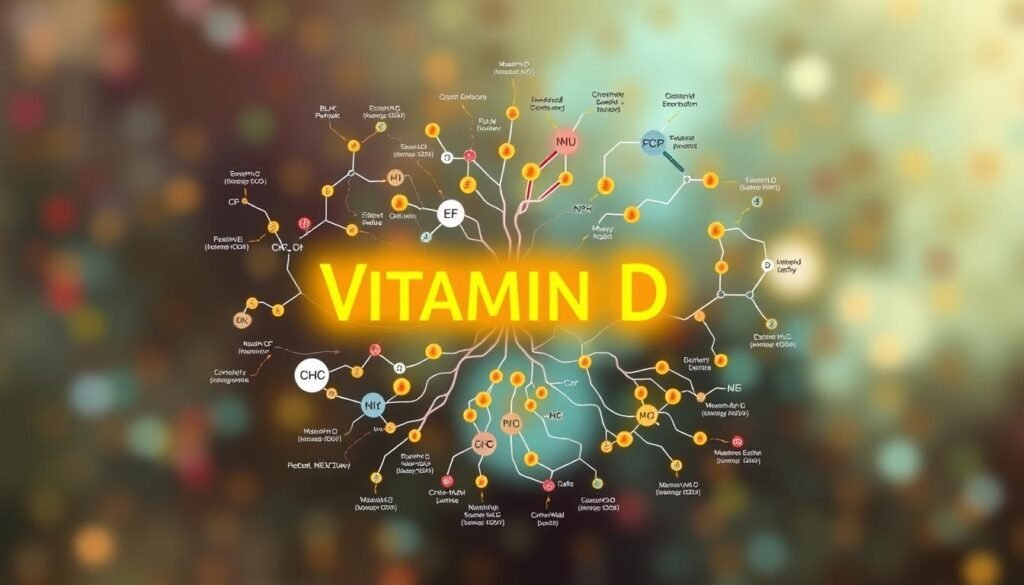About 40% of Europeans don’t get enough vitamin D. And 13% of them have a severe shortage. This shows a big concern about vitamin D and mental health. While not having enough vitamin D is linked to feeling depressed and anxious, too much of it can be bad too. If a person’s vitamin D in the blood goes over 100 ng/mL, that’s too much. And over 150 ng/mL might cause vitamin D toxicity. It’s important to find the right amount of vitamin D for your health. Too much can cause problems like anxiety. This guide looks into how vitamin D affects mental health. It especially explores if too much vitamin D can cause anxiety.
Key Takeaways
- The optimal range for vitamin D levels is between 30–60 ng/mL for health benefits.
- Higher than recommended doses, especially over 10,000 IU daily, may lead to vitamin D toxicity.
- Vitamin D overdose symptoms can include altered mental status and hypercalcemia.
- Monitoring vitamin D levels is crucial, especially for those taking high doses.
- Healthcare professionals recommend a safe daily intake of 4,000 IU or fewer for adequate levels.
- Vitamin D deficiency may exacerbate symptoms of anxiety and depression.
Understanding Vitamin D and Its Importance
Vitamin D is key to our health. It helps in more ways than one. It’s not just good for bones but also boosts the immune system. This vitamin makes sure calcium gets absorbed well. This is crucial for strong bones and teeth.
Vitamin D comes from sun exposure. It’s also found in some foods. Vitamin D sources include fatty fish and egg yolks. Fortified foods are another good source. People far from the equator or from minority groups often lack vitamin D. This shows the need for a good diet and enough sunshine.
Beyond keeping our bodies healthy, vitamin d function affects our mental health. There’s research linking it to our moods. Low levels might lead to mood dips, tiredness, and anxiety. So, knowing your vitamin D level is important. If you’re feeling down, check if you need more vitamin D. Eating foods rich in vitamin D and getting sun can help. For more info, check out this resource.
Vitamin D and Mental Health
Studies show a key link between vitamin D and our mental health. Knowing this connection helps tackle mood disorders related to vitamin D. It also aids in creating effective mental health strategies.
Link Between Vitamin D and Mood Disorders
Research has found that low vitamin D can be linked to more mood problems. These include depression and anxiety. A big study with over 7,500 people found vitamin D supplements reduced depression symptoms. This was especially true for those with very low vitamin D levels.
Taking less than 4000 IU of vitamin D for at least eight weeks was helpful. This shows how vitamin D plays a role in fighting depression.
Vitamin D’s Role in Neurotransmitter Function
Vitamin D is vital for making neurotransmitters like serotonin, which helps stabilize mood. Not having enough vitamin D can disrupt this, possibly leading to mood disorders. Studies with rats showed that high doses of vitamin D helped reduce stress-related behaviors. This indicates that enough vitamin D is important for fighting mood disorders and boosting mental health.
| Study Type | Population | Outcome | Vitamin D Dose |
|---|---|---|---|
| Meta-Analysis | 7534 participants | Reduced symptoms of major depressive disorder | |
| Preclinical Study | Ovariectomized rats | Antidepressant-like behavior | 5 mg/kg per day |
| Clinical Trial | Crohns Disease patients | Improvement in anxiety symptoms | 10,000 IU |
| Epidemiological Study | Various populations | Correlation between anxiety and vitamin D | N/A |
Can Too Much Vitamin D Cause Anxiety?
Vitamin D is key for good health and mental wellness. But is it possible that too much can lead to anxiety? Research indicates that getting too much vitamin D, which leads to toxicity, might negatively impact mood. High levels have been linked with anxiety-related symptoms.
Many Americans, about 40%, don’t get enough vitamin D. This lack can lead to several health problems, including anxiety. Symptoms of low vitamin D include tiredness, joint pain, and feelings of anxiety. So, it’s important to find the right balance of vitamin D for mental health.
Adults should typically take 1000 to 2000 units of vitamin D each day. Too little vitamin D can cause serious health issues. Too much can also be risky. A test called the 25-hydroxy vitamin D blood test helps keep levels in a safe zone, between 40-80 ng/mL.
With vitamin D deficiency on the rise and worries about toxicity growing, finding a balance is key. Some people, like those who don’t get much sun, have darker skin, or certain health issues, are at greater risk. By paying attention and adjusting as necessary, people can avoid the dangers of too little or too much vitamin D. This helps keep mental health in check.
| Vitamin D Levels | Effects |
|---|---|
| Below 20 ng/mL | Deficiency – Linked to health problems and anxiety |
| 40-80 ng/mL | Ideal Range – Supports mental and physical health |
| Above 100 ng/mL | Potential Toxicity – May cause anxiety and other symptoms |
Symptoms of Vitamin D Overdose
It’s essential to know the symptoms of too much vitamin D. This condition, often from too many supplements, can be dangerous. Recognizing these signs early helps prevent more severe problems.
Recognizing Vitamin D Toxicity Symptoms
High blood calcium levels signal vitamin D toxicity. You might feel:
- Nausea and vomiting
- Weakness and fatigue
- Frequent urination
- Bone pain
- Increased thirst
Too much vitamin D can lead to kidney stones or worse, kidney failure, if levels hit 100 ng/mL. The safe calcium range in our blood is 8.9–10.1 mg/dL. Levels above 10.4 mg/dL mean trouble.
Hypercalcemia: The Primary Concern
High vitamin D doses raise hypercalcemia risk. Taking 60,000 IU daily can harm you. Avoid exceeding 4,000 IU daily. For insights on alcohol and anxiety, check out this page.

| Calcium Level (mg/dL) | Condition | Symptoms |
|---|---|---|
| 8.9 – 10.1 | Normal | No symptoms |
| 10.2 – 10.4 | Elevated | Mild fatigue, nausea |
| 10.5 – 12.0 | Hypercalcemia | Severe weakness, vomiting, frequent urination |
| Above 12.0 | Severe Hypercalcemia | Kidney dysfunction, confusion, bone pain |
Vitamin D Toxicity: Causes and Risks
The trend of taking vitamin D supplements has sparked worries about toxicity. This issue mainly comes from excessive vitamin D intake via high-dose supplements. Foods rarely cause this problem. Knowing why vitamin D toxicity happens and its risks is vital for good health.
Excessive Vitamin D Intake from Supplements
In the United States, supplements aren’t as tightly controlled as medicines. This makes too much dosing easier. Adults often need 600 IU daily, but over 10,000 IU can cause big health problems. Most vitamin D toxicity cases happen due to too many supplements or wrong prescriptions.
The FDA warns that very high vitamin D blood levels, over 100 ng/mL, may be harmful. It’s especially risky if levels climb above 150 ng/mL.
Long-Term Effects of High Doses
Too much vitamin D for too long can bring serious problems. High doses risk causing hypercalcemia. This can harm kidneys and bones. Vitamin D toxicity signs include nausea, throwing up, weak muscles, and lots of thirst.
If not treated, high vitamin D can lead to kidney stones. It can also cause blood vessels and tissues to harden. It’s key to watch vitamin D levels when using supplements to stay healthy.
The Correlation Between Vitamin D and Anxiety
Research shows a close link between vitamin D levels and anxiety. Many people don’t have enough vitamin D, and this lack often goes hand in hand with more anxiety. This link between vitamin D and anxiety can give different outcomes, especially when looking at how vitamin D supplements work.
Research Findings on Anxiety from Supplements
Many anxious individuals turn to supplements for relief. They may feel more anxious if supplements don’t help or if they take too much. Vitamin D supplements can help those who are short on this nutrient. Yet, how these supplements affect anxiety at higher doses is still being debated. Some find that more vitamin D makes their anxiety worse, not better.
Vitamin D’s Mechanism in Mental Health
Vitamin D matters a lot in how our brains handle stress and health. It helps control inflammation and stress in our bodies, affecting anxiety. Not having enough vitamin D can make these problems worse, raising anxiety levels. Knowing how vitamin D works in the brain helps in finding the right amount for mental health.

Safe Dosage of Vitamin D
Finding the right vitamin d dosage is key for good health. Most adults can take 600 IU to 4,000 IU each day safely. Some people, like older adults or those with certain health conditions, may need to watch their intake more closely. Knowing the recommended dietary allowances helps make wise choices about vitamin D.
Recommended Dietary Allowances (RDA)
The Institute of Medicine says the most vitamin D you should take is 4,000 IU a day. These rules help people stay safe while using supplements as needed. Children on vitamin D supplements need doses tailored to them. It’s important to watch their levels to avoid too much vitamin D. Regular visits to the doctor are best to find the right amount.
Monitoring and Adjusting Vitamin D Intake
Regular blood tests check your vitamin D levels. This helps you change your intake if needed. High doses could be harmful over time. You should work with your doctor to find a plan that’s right for you. Making the right changes can keep you healthy, avoiding too much vitamin D. For more about how stress impacts your stomach, check out this resource.
| Age Group | Recommended Dietary Allowance (RDA) IU/day | Upper Limit IU/day |
|---|---|---|
| Infants (0-12 months) | 400 | 1,000 |
| Children (1-18 years) | 600 | 4,000 |
| Adults (19-70 years) | 600 | 4,000 |
| Older Adults (71+ years) | 800 | 4,000 |
Vitamin D’s Biochemistry and Effects on the Body
The vitamin D biochemistry is crucial for many body functions. It’s key for bone health and more. It helps our bodies use calcium, making our bones strong and well-built.
But its effects go beyond bones. Vitamin D plays a part in how our hormones work and supports our immune system. This keeps our health in good shape.
Many people around the world, about 1 billion, lack enough vitamin D. Not having enough can cause serious problems. It can even lead to higher risks of dying from various causes.
This is because vitamin D is vital for many body processes. Without it, our health can suffer in many ways.
Vitamin D also boosts our mood and mental health. It works like a steroid for our brain, helping in the making of neurotransmitters. It’s also linked to lower risks of feeling depressed.
This shows how important vitamin D is for both our physical and mental wellness.

The following table highlights the main roles of vitamin D and how it impacts our health:
| Function | Health Impact |
|---|---|
| Calcium Absorption | Strengthens bones and prevents osteoporosis |
| Hormone Regulation | Maintains hormonal balance and affects mood |
| Immune Response | Boosts immunity against infections |
| Neurotransmitter Production | Affects mood stabilization and mental health |
| Cellular Growth | Reduces risk of certain cancers and chronic diseases |
Vitamin D and Inflammation
Vitamin D is essential for our health, especially for controlling inflammation and bolstering mental health. Studies show it has anti-inflammatory effects. These can help manage oxidative stress and mental health problems. Knowing how vitamin D targets inflammation and mental issues can show its advantages for those with anxiety or depression.
Oxidative Stress and Its Impact on Mental Health
Oxidative stress occurs when there’s an imbalance between free radicals and antioxidants. This can cause cell damage and affect mood. Vitamin D combats this stress by boosting antioxidant defenses. This could help in preventing issues related to anxiety and depression. Keeping vitamin D levels adequate is crucial for brain health and tackling mental health challenges.
The Role of Vitamin D in Immune Response
Vitamin D is crucial in managing the body’s immune response and controlling inflammation. It ensures our body’s systems are in balance by influencing immune function. Adequate vitamin D can help the body manage immune responses. This may lower the chance of mood disorders linked to inflammation. Checking vitamin D regularly is wise for mental health care. For more details, read this informative article.
Managing Vitamin D Levels in Your Body
To keep your vitamin D levels right, it’s good to eat foods rich in it. This step is vital for your health, helping both your body and mind stay strong.
Natural Sources of Vitamin D
Eating foods high in vitamin D helps maintain its levels without too much supplement use. Foods like:
- Fatty fish (such as salmon, mackerel, and sardines)
- Egg yolks
- Fortified foods (like milk, orange juice, and cereals)
- Cod liver oil
Getting some sun also increases your vitamin D naturally. Try to get 15-30 minutes of sunlight several times a week. Your skin type and where you live can affect how much sun you need.
Importance of Regular Testing
It’s smart to test your vitamin D levels often, especially if you’re at risk of being low. People who don’t get much sun or miss vitamin D in their diets should check their levels. This helps you stay healthy physically and mentally.
Regular checks let you adjust your vitamin D as needed. This way, you avoid too little or too much of it. Finding the right balance is key.
Taking Supplements Safely
Vitamin D supplements are key for good health, especially when sun exposure is low. *When considering vitamin D supplements*, it’s vital to know how to use them safely. This means taking the right amount to avoid risks. People should be careful when starting supplements.
When to Consider Vitamin D Supplements
Some need vitamin D supplements more than others. They may not get enough sunlight. Here are some reasons to think about using these supplements:
- Living in places with less sunlight, especially during long winters
- Having certain health issues or dietary limits
- Being over 65 years old, which makes absorbing vitamin D harder
- Having low vitamin D levels in your blood (
Before taking any supplements, *consult healthcare professionals*. They give advice on the right dose for you. Over 100 ng/mL is too much, while over 150 ng/mL is dangerous. Ideal levels are between 30–60 ng/mL for health.
Consulting Healthcare Professionals
Asking doctors about vitamin D is smart. They help make sure it’s safe and works well. They can:
- Check your vitamin D levels through blood tests
- Suggest how much you need, based on your health
- Watch for any side effects and change your dose if needed
- Advise on foods rich in vitamin D
Making sure *vitamin D supplements are safe* means being aware of dangers. For example, taking too much for too long can lead to hypercalcemia. Choosing to supplement correctly and checking in with doctors keeps you safe. It ensures you get the best from your vitamin D.
Limiting Excessive Intake of Vitamin D
It’s crucial to keep your vitamin D levels in check for good health. To prevent getting too much, called hypervitaminosis D, watch your intake. This can cause serious health issues. Knowing the signs of too much vitamin D helps catch problems early, keeping you healthy.
Signs of Excessive Vitamin D Levels
Vitamin D poisoning is uncommon but happens with too many supplements. Watch out for signs like:
- Nausea and vomiting
- Mental confusion or cognitive changes
- Weakness and fatigue
- Frequent urination
- Bone pain and kidney issues
These signs, especially severe cases, relate to too much calcium in the blood, called hypercalcemia. This can even lead to confusion or coma. So, it’s critical to control your vitamin D levels.
Preventive Measures Against Overdose
To prevent too much vitamin D, follow these steps:
- Don’t start high-dose vitamin D on your own. Always talk to a doctor before you begin.
- Test your vitamin D levels regularly to keep track and stay safe.
- Follow the Recommended Dietary Allowance (RDA) of 600 IU for most adults.
- Watch your intake of fortified foods to avoid accidentally getting too much vitamin D.
By sticking to these tips, you can avoid vitamin D overdose and keep your levels just right for your health.
Conclusion
Understanding how vitamin D affects our mental health is key to feeling good. It’s not just for keeping our bones strong. It helps our mood too. But, too much or too little vitamin D can affect anxiety levels.
To keep our minds healthy, we need the right amount of vitamin D. Adding foods like fatty fish and getting some sun can help. A doctor can test our vitamin D levels to make sure we’re getting enough but not too much.
It’s important to talk to a doctor about vitamin D and our diet. Anxiety can get complicated when we don’t have enough nutrients. Awareness and the right steps can help manage vitamin D. This might make us feel happier and healthier overall.